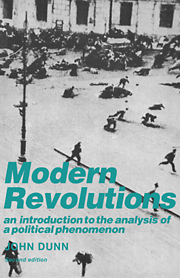Book contents
- Frontmatter
- Contents
- Preface to the first edition
- Introduction to the second edition
- Introduction: the ideological dilemmas of moden revolution and its analysts
- 1 Russia
- 2 Mexico
- 3 China
- 4 Yugoslavia
- 5 Vietnam
- 6 Algeria
- 7 Turkey
- 8 Cuba
- Conclusion: approaches to the ideological assessment and causal explanation of modern revolutions
- Notes
- Bibliography: guide to further reading
- Supplementary reading, 1971–88
- Index
- Frontmatter
- Contents
- Preface to the first edition
- Introduction to the second edition
- Introduction: the ideological dilemmas of moden revolution and its analysts
- 1 Russia
- 2 Mexico
- 3 China
- 4 Yugoslavia
- 5 Vietnam
- 6 Algeria
- 7 Turkey
- 8 Cuba
- Conclusion: approaches to the ideological assessment and causal explanation of modern revolutions
- Notes
- Bibliography: guide to further reading
- Supplementary reading, 1971–88
- Index
Summary
The revolutions analysed in this work are merely a sample of the revolutions which the twentieth century has seen, but they are some distance from being a random sample. Russia, China, Vietnam, Yugoslavia and Cuba all experienced revolutions which were in a conventional (though rather extended) sense ‘Marxist’ revolutions, though even in this sense of the word only that of Russia was explicitly Marxist in inspiration and leadership from start to finish. The remaining three revolutions were decidedly more heterogeneous. Mexico, Turkey and Algeria were none of them especially Marxist in the initial orientation of their revolutions and two of them, Mexico and even more Turkey, are now rather close allies of the leading anti-revolutionary power in the world today, the United States. The revolutionary regimes in Russia, Mexico and Turkey have held power for long enough for it to be possible to judge their capacity to cope with the problems of their country (though all in fact continue to trespass on the charity of their adherents by pinning their legitimacy firmly on the less than immediate future). The other revolutions, with the possible exception of Yugoslavia have either been successful for too short a time or else have so extended their objectives since their initial achievement of power that it is still hard to make out what sort of impact they are eventually going to have had on the condition of their peoples. In important respects half at least of these revolutions are still incomplete and from one perspective all of them are still incomplete.
- Type
- Chapter
- Information
- Modern RevolutionsAn Introduction to the Analysis of a Political Phenomenon, pp. 24 - 47Publisher: Cambridge University PressPrint publication year: 1989



